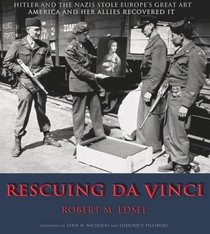Search -
Rescuing Da Vinci: Hitler and the Nazis Stole Europe's Great Art - America and Her Allies Recovered It
Rescuing Da Vinci Hitler and the Nazis Stole Europe's Great Art - America and Her Allies Recovered It
Author:
During and following WWII, a special multinational group of more than 350 men and women served behind enemy lines and joined frontline military units to ensure the preservation, protection, liberation and restitution of the world's greatest artistic and cultural treasures. This "band of unsung heroes," formally referred to as the Monuments,... more »
Author:
During and following WWII, a special multinational group of more than 350 men and women served behind enemy lines and joined frontline military units to ensure the preservation, protection, liberation and restitution of the world's greatest artistic and cultural treasures. This "band of unsung heroes," formally referred to as the Monuments,... more »
ISBN-13: 9780977434909
ISBN-10: 0977434907
Publication Date: 12/15/2006
Pages: 302
Edition: Illustrate
Rating: 2
ISBN-10: 0977434907
Publication Date: 12/15/2006
Pages: 302
Edition: Illustrate
Rating: 2
3.8 stars, based on 2 ratings
Publisher: Laurel Publishing, LLC
Book Type: Hardcover
Members Wishing: 14
Reviews: Amazon | Write a Review
Book Type: Hardcover
Members Wishing: 14
Reviews: Amazon | Write a Review
Genres:
- Arts & Photography >> History & Criticism >> General
- History >> Military >> General
- History >> Military >> World War II >> General




